Feed aggregator
Love. Exciting and New.
Yes, there certainly is a wide variety of stuff we come across in Furry Fandom. Things like… Forest of Love. It’s a new on-line game of a decidedly Adults-Only nature, currently being developed by Carrot and Vixel. A young raccoon fella, new in the forest, gets to meet all the neighbors… and find out just what they’re into… Visit their web site to try the demo game, find out how to join their Patreon, and check out other ways to get involved. They even have an available option to code your own custom character into the game!
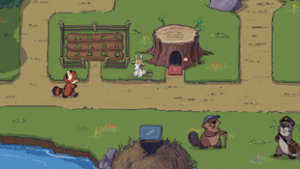
image c. 2019 forestoflove.com
[Live] Imperial Pussy

bark bark bark bark delicious pizza bark bark
Link Roundup:- Bad dragon’s marketing team goes above and beyond
- Dazed: Why furries are fighting over ‘designer’ fursuits
- New York State makes declawing illegal
- Still snarling after 40,000 years, a giant Pleistocene wolf discovered in Yakutia
- TWRP – Starlight Brigade (feat. Dan Avidan) [Official video]
- Aggretsuko: Season 2 | Official Trailer | Netflix
- Conditions: Erectile Dysfunction
- Totally Curable Disease on the Rise
- Burgler Turns out to be Deer
- All Life will end in 30 Years
- Erection Lasting for 9 Days
- Jojer – Hey, Thank You FurCast
- Sinoch Swiftpaw – Hey Guys
- Boom Sling – “Work”
- Otto – “A very long message from an otter”
Dog in the Woods

Yeah, this is how I see nature at night. ...this is why I stay in despite how tempting it is.
View Video
Interdimensional Melancholy
Custom Critters
Seems like more and more fur-suit makers are getting enough steady business that they’re now setting up their own dedicated web sites. The latest we discovered: Lucky Gum FurSuits (“Custom Critters by Xeny”). As of this writing their commission list is closed, but you should visit often to see when it opens again. That, and visit their Etsy Store (“The Lucky Gum Club”) to check out the other artwork and goodies they have available on line.
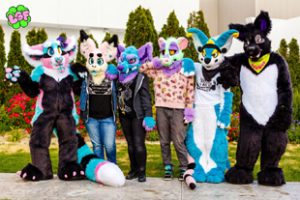
image c. 2019 Lucky Gum FurSuits
Furnace of the Birds
S8 Episode 14: Woof! - Roo and Vaos went to BLFC and met every single pup in the world! OK, not every single one, but we definitely explored the world of pup play! Sammy also joins us to share his insight into pup play. So get ready - grab your collars, c
NOW LISTEN!
Show Notes
Special Thanks
All of you who wrote in!
Kenji, for his voice clip.
Chris (aka Leon), Mr. Atlanta Eagle 2018 and avid pup player!
Pup Sam who is our guest in studio!
Pup Chariot, who is the cover image pup for this episode.
Patreon Love
The following people have decided this month’s Fur What It’s Worth is worth actual cash! THANK YOU!
Kit
Rifka, the San Francisco Treat and Baldrik
Lokimutt and Guardian Lion and Dusky and Katchshi
Plus Tier Supporters
Skylos
Snares
Ausi Kat
Chaphogriff
Lygris
McRib Tier Supporters
Roliga
Music
Opening Theme: RetroSpecter – Cloud Fields (RetroSpecter Mix). USA: Unpublished, 2018. ©2011-2018 Fur What It’s Worth. Based on Fredrik Miller – Cloud Fields (Century Mix). USA: Bandcamp, 2011. ©2011 Fur What It’s Worth. (Buy a copy here – support your fellow furs!)
Space News Music: Fredrik Miller – Orbit. USA: Bandcamp, 2013. Used with permission. (Buy a copy here – support your fellow furs!)
Closing Theme: RetroSpecter – Cloud Fields (RetroSpecter Chill Mix). USA: Unpublished, 2018. ©2011-2018 Fur What It’s Worth. Based on Fredrik Miller – Cloud Fields (Chill Out Mix). USA: Bandcamp, 2011. ©2011 Fur What It’s Worth. (Buy a copy here – support your fellow furs!) S8 Episode 14: Woof! - Roo and Vaos went to BLFC and met every single pup in the world! OK, not every single one, but we definitely explored the world of pup play! Sammy also joins us to share his insight into pup play. So get ready - grab your collars, c
An Unquenchable Urge To Learn
The artist and creator known as Tsebresos has been making the rounds at furry fandom conventions for some time now — but this year at Biggest Little Fur Con, we finally picked up her card! Seems like she’s been busy not only creating lots of artwork, but lots of fur-suits too — not to mention extra parts for the latter. Over at her web site she has extensive galleries showing off her work, as well as links to her Etsy store where you can find her art on t-shirts, prints, and so on.
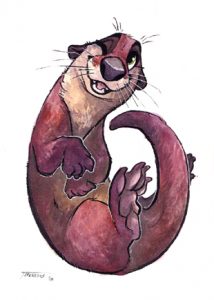
image c. 2019 by Tsebresos
Mistar Urdd to be Welsh team mascot at 2022 CWG as youth organisation becomes charity partner
Not So Funny When It Happens To You?
Okay, here’s what we know: It seems Marvel Comics had a pair of classic funny animal characters called Ziggy Pig and Silly Seal. Now they’ve been brought back to life in a… considerably different situation as part of Marvel’s recent slew of one-shot comics. “Once they were superstars of the Funny Animal Comedy circuit! Now money and fame have ruined their friendship. Will it ruin their lives?” Find out in the Ziggy Pig Silly Seal Comics one-shot, written by Frank Tieri (Wolverine, Space Punisher) and and illustrated by Jacob Chabot (Marvel Super Hero Adventures). Marvel has a preview video, interviewing the creators.
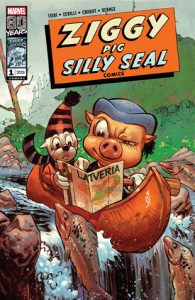
image c. 2019 Marvel Comics
Borobi Day gives local language a voice
[Live] Fake Moos

Sorry you haven’t herd from us in a while! This week our local fur friend Aureo Bull joins us to sort through some choice content. The steaks were high and we had quite a beef, but managed to steer things in the right direction. Enjoy a nice grazing of news and emails.
Link Roundup:- Telegram Happenings:
- NPR: What Brain-Controlled Exoskeletons Mean For You
- Old tweet: Revit’s Purring
- CJ Husky is up to driving badly
- Mao Mao cartoon trailer
- Furry Convention Outperforms Consensus NYC 2019
- Ursa Major Award 2018 Winners
- Humanimals Body Paint Timelapse
- Dragget Show Announcement
- Elon Musk tweets about catgirls
- U.S. now seeking social media details from most visa applicants
- Slow Cow, the Mind Cooler
- Ghosting the Attendees: the problematic trend of conventions hiding their headcount
- Austrian Official Warns Against ‘Cow Kissing’ Challenge For Charity
- ‘Guardian Angel’ Pigeon Helps Driver Avoid Speeding Ticket
- Wild Dog Escapes Lion
- Man Weirded Out that House was Broken Into and Cleaned
- Kodi – “Fursuit Completion Help Update”
- Phauxelate – “Podcast Show Question: What is the best way to find a partner?
Issue 3

Welcome to Issue 3 of Zooscape!
Transformation has always held a place of significance in the world of furry fiction. Those of us who love animals also love to imagine becoming animals, or imagine animals becoming us. Transformation stories can blur the lines between humanity and our animal cousins, or throw those lines into sharp relief.
The very act of reading fiction is transformative — for a brief time, you become someone else, somewhere else, thinking someone else’s thoughts. So, take your own journey of transformation through theses stories, and find out who you are when you come out on the other side.
* * *
A Warm, Dark Place in the Earth by Mackenzie Kincaid
Sealskin by L Chan
Human Through and Through by K. A. Rochnik
Good, Better, Best by Rachel Rodman
Dragons Are Made by Searska GreyRaven
Spider, Dreaming by Michelle Muenzler
* * *
If you want to help Zooscape transform the world, share our stories far and wide, and if you’d like, we’d love to have you submit stories of your own. (Here are our guidelines!) If you’d like to contribute more substantively, Zooscape now has a Patreon, and any money we receive will go directly to buying more awesome furry fiction to share with the world.
Spider, Dreaming
by Michelle Muenzler
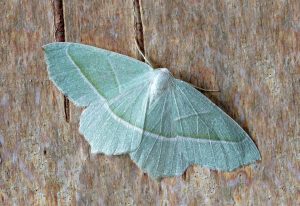 “So many dead moths, their corpses hollowed as though sucked clean through a straw.”
“So many dead moths, their corpses hollowed as though sucked clean through a straw.”
She dreams she is a spider. Words sail from her spinnerets, casting traps about the space she occupies and capturing the pale gray moths that formulate her entire diet.
Except… she doesn’t just dream she is a spider.
She is a spider.
She is vast. Her abdomen bulges with words. With worlds.
The universe quakes at her passage, bits and pieces crumbling into the void. Without her span, there is nothing. Formlessness rules. But she has given order to the chaos. Has bound meaning to shape, intent to result. The laws of nature wrap themselves about her eight monstrous legs, caught in the tiny hairs along their breadth.
Her abdomen ripens with passage. She soils the stars with her castings. With the corpses of moths.
When her abdomen is finally ripe enough to rot, distended a stitch away from bursting, she pushes forth the fruit of her labor, a sticky mass of eggs, glistening and wet into the cradle of threads she has woven.
Done, she allows herself to drift into the void’s inevitable embrace.
And then she wakes.
Or perhaps only now does she sleep.
Whichever it is, the desk before her is crowded with papers. With pens.
And moths.
So many dead moths, their corpses hollowed as though sucked clean through a straw.
She does not remember writing the beautiful and terrifying words still wet upon each page, but they can only be hers. So she gathers them up, sifting through them to find order to their meaning, and prepares herself for the labor of creation.
Because she is a spider dreaming she is a woman dreaming she is a spider, dreaming.
And there is so much more yet to dream.
* * *
 About the Author
About the Author
Michelle Muenzler, known at local science fiction and fantasy conventions as “The Cookie Lady,” writes fiction both dark and strange to counterbalance the sweetness of her baking. Her short fiction and poetry can be read in numerous science fiction and fantasy magazines, and she takes immense joy in crinkling words like little foil puppets. Visit michellemuenzler.com to find links to more of her work, or if you are feeling especially brave, check out the squidgy weird adventures of Hetha and her shark-man companion Mobi in The Hills of Meat, the Forest of Bone on Amazon. She promises it won’t bite… much.
Dragons Are Made
by Searska GreyRaven
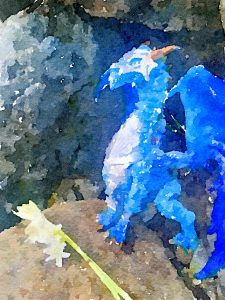 “And every morning I’d find another lily of the valley, placed just so on my doorstep.”
“And every morning I’d find another lily of the valley, placed just so on my doorstep.”
Dragons are made, not born.
We make ourselves, one scale at a time, forged from seething rage and quenched in cold hate. We string each scale together, forming chains, forming mail, armoring ourselves with these heavy plates because they feel like protection. We don’t think about how they weigh us down, or of the wings clenched tight to our backs.
Dragons don’t fly. We might have been born with wings, whatever we were before—
(I don’t remember what I was before.)
—but a dragon’s armor is too heavy and too solid for flitting about.
Deep in our lairs, we curl around a pit filled with fire. Each carnelian coal is a moment we refuse to forget. It scorches our bellies, our hands, our most vulnerable places. Blackened claws, now tempered from the flames, turn over each glowing carbuncle, some dull and red as old blood, others incandescent and spitting sparks. We remember each violation, each vicious insult, every punch and slap and slight we suffered. We breathe new life into them so that we may never, never forget what they did to us and why we sheathe ourselves in dragon skin.
We remember these things so hard that we forget the feeling of wind, the color of the sky, the taste of sugar as it melts on our tongues.
A thousand men have tried to storm my sanctuary, and each one I have destroyed or devoured. Each one bloated with his own hubris, his own self-importance, the conviction that he would be the one to shatter my armor and tame me once more, and return me to my place.
They wanted to strip me to my skin, bear my soft places and press me into mewling obedience. A conquered dragon for a concubine.
But I learned well at the knee of monstrosity; my scales are perfect, my armor a masterwork. There is nothing soft left for knights with wicked swords to penetrate.
But you… you were no knight. You came to me, unarmed and unarmored. You had feathers where I had scales, edges smooth where mine were knives, and a song where I could only hiss. You perched upon the stones above my door and didn’t budge, no matter how I growled. But as you sang, my muscles eased and the rumble of my ire slowly drained away. I listened, enraptured, as your last note hovered between us.
I didn’t know harpies could sing, I said.
You tilted your head to the side, birdlike and strange, and asked me how heavy my scales were.
Heavy, I said. The better to protect me, my dear.
But why? you asked.
Because the world is cold and cruel.
All of it?
All of it.
You went silent then, and I woke that morning to find the place above my door empty. I wanted to be relieved, but I felt… something else. I had to dig the word out of my memory.
Lonely.
I turned the word over between my talons and worried at it. Did it belong in my hoard? Would it be malleable enough to form scales? I didn’t know, and fussed with it for days.
When you returned, I felt something else I’d forgotten. Joy.
In your hand, you held a single flower, a lily of the valley.
Those are poison, I said, wary.
Only if you eat them, you said.
I did not eat it. I tucked your flower into the mouth of an old wine bottle and set it beside my bed of coals. Its scent pushed back the reek of smoke for a time.
It was… nice. No, not nice. Peaceful. Another word I’d forgotten.
I didn’t know what to do with peaceful. But I remembered enough of what I was before to know that one must give gratitude for gifts.
I came back to the threshold to thank you, and you sang, thrilled that your lily had brought me peace.
Three scales fell from my back, chiming like bells upon the stone floor.
Panicked, I scooped them up and retreated deeper into my lair. You called out, but didn’t follow.
I reforged the scales and hammered them back into place, but my strokes, once sharp and sure, pulled unevenly. It took far longer than it should have, but I managed at last. With shaking fingers, I fastened them upon my shoulder and breathed easy once more.
I found you where I’d left you, puzzled and puzzling.
You broke it, you said.
No, I fixed it.
It was a week before we spoke again. You brought me more lilies, sang to me songs you’d heard from larks and nightingales, and I tried to hide how happy I was to see you once more.
Happy was a thing used to bait traps of pain; I was too canny to fall for it again.
(Wasn’t I, though?)
There’s a story, you said, about wisdom and words.
I grunted, not really interested in the story so much as hearing the sound of your voice. You wove a tale of hope and happiness, of a goddess of wisdom who once begged for truth from a the world tree, and it told her the secrets of the world: four words to start a war, thirteen to end it, seven words to unlock a person’s heart and fourteen more to seal it.
Any heart? I asked.
Even a dragon’s heart, you trilled.
I snorted. Not likely, I said. If that were true, one of those ass-faced knights would have tried it already.
You shrugged, covert feathers along your shoulders whispering. Maybe it’s not the same seven words for everyone.
Perhaps, I said. Perhaps it’s not even just seven. It could be five, or nine, or twenty-two. It might even be seven notes of music.
We sat in silence and watched the bats delve and play between the stars.
Do you know many stories? I asked.
You nodded. Would you like to hear another story, you asked.
Yes, I said, and you wove a tale about gryphons and mermaids and a great battle between sea and sky. I listened, enchanted, and didn’t even notice my scales had fallen askew again.
That night, I dreamed of wings.
I found you back on your perch, right by my door. I settled down with a clatter, right there on the threshold.
Tell me another story, please, I said.
You nodded, and told me a tale of distant places and strange mountains with stranger beasts. There were clouds made of cotton candy and trees made of chocolate, lakes of sweet sugar syrup, and schools of gingerbread fish with gumdrop scales.
Gumdrop scales, I laughed. Gumdrops wouldn’t make good scales.
They do just fine for the fish, you said. Scales aren’t just for armor.
Then what good are they? I asked.
I don’t know, you said. Ask the fish.
I didn’t laugh. Laugh is too kind a word for the shattered sound that left my throat. It echoed through the shadows of my lair and died at my feet.
For that, I said, I’d need to leave my lair.
You nodded.
I can’t leave my lair, I said. What would happen to my forge, my coals? My scales would rust right off! Besides, I can’t fly. Not anymore. I don’t even think I remember how.
You have to take off your scales to fly, you said.
I didn’t speak to you for days for that. Every night, I dreamed of flying, of devouring candy clouds and chasing gumdrop-crusted fish.
And every morning I’d find another lily of the valley, placed just so on my doorstep.
I can’t just give up my scales, I said again. I need them. They protect me.
They hide you, you said.
That too.
From the good and the bad.
It’s mostly bad.
Am I bad?
…
Tell me a story, I demanded.
But this time, you didn’t. You left, the scent of lilies fading on the wind.
I dreamed of stars and storms and spiraling winds. My back ached and my wings strained, but my scales. My scales were too heavy for them to lift very far.
I don’t need wings, I assured myself. Wings are for soft things, things willing to be savaged and hurt, broken! I am not that person anymore. I’m a dragon! Fierce and vicious and…
…free.
I found you the next day, bent over my forge. I don’t know how you got in, but before I could stop you, you reached out and touched one of the carbuncles, an old and dim one as red as rubies, but still far too hot for bare skin.
You yelped and dropped it, and I scooped it up, returning it to my hoard.
That was foolish, I said. Don’t you know not to touch hot things?
What are they? you asked.
Memories, I said. That one is one of my oldest, from when a boy kissed me.
Why does it burn?
Because I said no.
You nodded, solemn. And that one?
A lord tried to take what didn’t belong to him.
You pointed to the brightest of them all, at the center of my forge.
And that one?
That one, I said, made me a dragon.
Silence, for a time, only broken by the susurrus of my coals.
Would you like to hear another story? you asked, and I nodded. It was a story you’d heard from a butterfly, long ago, about an endling unicorn, a wicked king and his cursed kingdom, and how a valiant lost girl saved them all.
I have never seen a unicorn, I said.
Would you like to? There’s a spring where they dance, a few days from here. We could go, if you wish.
I would have to leave this place. I can’t. My scales are too heavy, I’d never make it.
Do you need all your scales, though?
I pondered the question, pulling at the seams of my armor and trying it out. Maybe I could leave a few scales behind. Just for a few days. Just for a little while. They were so heavy, there hadn’t been a knight in some time. And it had been so long since I’d felt sunlight on my face.
It felt…odd. I bounced on my toes as I walked, unused to being unburdened.
Alright, I said. Let’s go.
And we went, over and under and through the forest. The sun rose and fell three times, and we curled up together each night to watch the stars. When the sun rose, you sang to greet it, and I thrummed along as best I could.
And they were there, just like you said! Unicorns dancing in the mist from the waterfall, sipping from the spring and playing in the water without a care in the world. I laughed a true laugh, not the bitter thing I’d uttered in the dark.
They’re beautiful, I said. It’s like their hooves never even touch the ground when they dance.
You held out your hand, spread your sky blue wings in a graceful bow, and said, would you care to dance with me?
I couldn’t dance, not really, not even with my armor diminished, but I could at least weave among them. You held my claws in your hands, never mind the soot and the scars, and we danced heavy and strange through a throng of glittering, dancing unicorns. The wind in the leaves and the water in the stream and the bell-like laugh of unicorns were the only music we needed.
It was perfect.
Until the hunters came.
Hounds baying and arrows flying, they burst into the clearing and attacked. I roared and leapt into the fray. Teeth snapped, bones shattered, and swords clattered uselessly against most of me. I shrieked when I felt an arrow pierce my arm.
Foolish. So foolish to leave behind my scales!
The hunters retreated, unprepared for a dragon, and I turned on you.
This is why I don’t leave, why I never take off my armor, I snarled. It’s never safe! I ripped the arrow from my flesh and bellowed. The remaining unicorns fled in terror, heels flashing into the darkening forest. I roared, coughed. Another blazing coal fell from my lips into my palm. I cradled it to my chest, ruddy light dripping between my fingers and the reek of singed flesh in my nose.
You’re burning yourself! Stop! you cried.
It wouldn’t burn, I hissed, if I’d had my armor.
You wouldn’t need your armor if you let the rage burn out on its own! Coveting it like that only makes it worse!
You don’t understand. You wouldn’t understand. Couldn’t understand. My armor protected me; my armor kept me safe. I need it.
I don’t need it, you said.
Then you’re a fool!
No greater a fool than the one who burns themself on their own rage!
I went back to my lair, curled around this new hurt, and tucked myself back under my sheathe of scales. I slept, dreamless.
Sometimes dreamless.
No, that’s a lie. I dreamed of the sky even when I was awake. I dreamed of dancing unicorns and the shimmer of sunlight on water, and blue wings against a blue sky, all mine if I would. Just. Take off. The scales.
If I would just let the rage-fueled embers burn out.
But the coals made scales, scales protected me, and it was foolish to be unprotected.
Did I want to stay armored more than I wanted to dance? I didn’t have an answer for that.
Dragons don’t dance. I’d have to stop being a dragon if I ever wanted the sky again.
If I ever wanted—
—no, I refused to even consider wanting more.
I caressed the edges of my armor, remembering the feeling of cool mist against my bare skin. I wasn’t ready to shed them. But maybe…maybe not all the scales. Maybe just a few, I could give up.
Some would be easy to take off, I was sure. But some were fused to each other by the heat of the forge and years of sleeping on my bed of rage; they wouldn’t pry loose without a fight.
The very thought of fighting with my own armor made me weary beyond measure, and I crawled back atop my fiery bed.
I woke to the scent of flowers, and found upon my step another lily of the valley, entwined with an iris and a single pine branch. Nestled in the center were several purple hyacinth blooms.
I held your elegant bouquet in my arms, and waited for you to return. You fluttered down, settled farther from me than usual, and it made my heart ache.
Hello, you said.
Hello.
Silence.
I got your flowers, I said finally.
You nodded.
I took out the coal from that awful day and set it on the stone floor. It spat a few sparks.
I thought about what you said.
Silence.
I don’t…
The words caught in my throat. I tried again.
I don’t know how to be anything but this.
Silence, a longer one.
But.
…
I want to.
You hopped close and peered at my armor. You touched one steely scale with the tip of your finger, prying it up and away from my skin. Gently, gingerly, you tugged it free and laid it over the coal, smothering it.
And then, you reached up, feathers brushing the place laid bare, the first soft thing I’d felt in an age and more. I shivered, and wondered what it might feel like to have feathers instead of steel.
One scale at a time, you said. I shouldn’t have asked for more than that. One at a time. We’ll do it together.
And then? I asked.
And then we see the unicorns again.
And dance with them?
And dance with them.
* * *
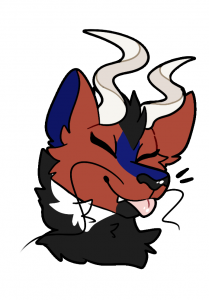 About the Author
About the Author
Searska GreyRaven has been writing ever since an eccentric sorceress was brave enough to teach her. She has been previously published in several anthologies, most recently in ROAR 9, Dissident Signals, and CLAW 1, and has had stories nominated for both the Cóyotl and Leo Literary awards. She makes her home in sunny South Florida, along with several bee hives, a fluctuating population of lizards, and a growing hoard of books guarded by a legion of plastic dinosaurs. She can be found on Twitter (SearskaGreyRvn) and posts occasionally on SoFurry (Searska_GreyRaven).
Good, Better, Best
by Rachel Rodman
 “And the story—the new story: amended and inverted—was written into her skin.”
“And the story—the new story: amended and inverted—was written into her skin.”
—1—
“Wolf!” cried the little pig, “Let me come in!”
She stood… this time… not before a cottage in storybook land, but rather before an apartment in 1908 Vienna.
And the pig, herself, was—possibly—not precisely a pig, but a construct, built of paper, with the parameters of her existence encoded upon it in ink. And with a dusting of magic, on top of that—a light layer of misdirection—which made her seem mostly human.
And the Wolf, somewhere behind that door, was, to a certain way of thinking, not a Wolf… but rather a young man, brooding and pitiable, and still somewhat shy of nineteen.
But the pig did not think in caveats.
Only in story.
And the story—the new story: amended and inverted—was written into her skin.
Instructions, in her skin.
(“Let me come in!” she oink-snarled, and rapped at the door with her hooves.)
Urgency and imminence.
In her skin.
(“Let me come in!” she huffed and puffed.)
The Imperative…
…In her skin.
(“Let me come in!”)
…And then the Wolf opened the door, just a little…
Through the slit, their eyes met… one wolfy eye first, then a second, as he let the door swing wider… and the Wolf drew in his own breath, riveted.
For there was something about her…
…an inexplicable luminosity…
So striking…
(And what, he thought—anyway… what, he thought—breathlessly—does a wolf have to fear from a pig?)
So the Wolf let her in.
And she killed him.
Killed him, strangled him, with a length of straw. With a yellow-white fiber, freshly fallen from a farm cart, which she had procured from a road just outside the city. Drew it back, a line of light wire against his throat, until his eyes bulged.
“Warum? Warum?” wheezed the Wolf, when she paused: once, twice, to incrementally relax her grip upon the fiber. “Warum?”
“Because you are the Wolf,” she shriek-oinked. And her ink bubbled and flared, so hot that the paper that composed her practically ignited. “Because you are the Wolf.”
Later, she danced upon the corpse. Danced and danced, hoof by hoof by hoof by hoof. Until what remained at her feet was only a jelly, a stain. And she spat, Oink, Oink, into the smear of it: the gore and shattered bones.
As she oinked, she felt the world and the future, rippling and altering around her: brighter and happier.
Done.
But…
When she exited the apartment, luminously human-like in her hat and overcoat, and with the blood mostly dabbed away, the pig paused.
For there, shuffling warily up the hallway, a question in his eyes, was… and she snatched clumsily amid the ripples, to apprehend that identity… the Wolf’s roommate.
…August Kubizek…
Around August, there were also ripples. But these ripples were quite bitter. August would be incarcerated for the Wolf’s murder; there would be no other suspects. And even after, long after, deep into his sentence, the trauma of this day would persist. What lay behind this door would haunt him: blood in his dreams; blood, too, when he was awake, and all the anguish that attends the violent loss of a friend.
For just a moment, the pig felt a little cold.
“Entschuldigung,” the pig said softly. She shuffled her feet–the whisper of a curtsy. Then, with an awkward little hop, she pressed a small and not-terribly-well-considered touch of her snout against August’s cheek: not quite a kiss—for whatever comfort, anyway, that that could ever be worth—and August drew back, astonished.
“Wer bist du?” August asked, just so softly.
But the pig slipped away, hurrying down the hallway. So August turned back to the door, thoroughly unnerved, and ever so slightly bewitched.
And, when his absentminded knock went unanswered, he reached, dazedly, into his pocket, to withdraw his key.
Out of the building, and through the streets, the pig fled. At the outskirts of Vienna, she threw off her disguise and dropped to all fours, faster and faster and faster. Then, once she had attained an improbable speed, she slipped, with a little grunt, into a space that—to a certain way of thinking—wasn’t there, and into a forest, where no man had ever been, where the sun rose in the west and set in the east, and where the great oaks shrank, shrank, down to saplings, and smaller still, and were swallowed up entirely by dirt, and then ceased to be.
“Chinny-chin-chin!” she sang, for hope and for triumph. And for life, life, life.
—2—
What the first little pig had done would serve. But the same text was also imprinted into the second pig’s skin. So, when his turn came—and it must come, for so ran the inexorable logic of the story—he was compelled to do one cleverer.
This pig pressed into a different section of the forest, deeper and darker. And, when he emerged, it was late autumn, in a different place, and at an earlier time: Braunau am Inn, 1888.
Here, at the village outskirts, he dilated his nostrils, searching, Snort, Snort, Snort, until at last he discovered it: black and pungent, inside the crumbling stump of a tree—a rot that grew on wood.
A rot that contained… power.
To distill that power, the pig availed himself of the equipment in a chemist’s shop—breaking in quietly, after night had fallen, to minimize the likelihood of attracting notice.
What remained, as pure as he could make it, once the final layer of ethanol had evaporated, was a small cluster of potent crystals, glittering pink under the rays of his candle.
An abortifacient.
At dawn, at the market, he purchased more quotidian supplies: meat and vegetables; spices and cooking equipment. Then he retreated to the town outskirts for the better part of a morning, chopping and stirring over a wood-fed fire.
In the afternoon, plausibly arrayed as a cook, he slipped into the Wirtshaus, where the Wolf’s mother occasionally—and today, in particular—would come for lunch.
At her table, bowing, he presented the bowl of soup, appetizingly scented.
Once again: there were ripples everywhere. And, as Klara set the spoon down into her soup, this pig, cleverer than his sister, felt their imminence.
Nearly all of the ripples were exquisite. Cataclysmic. And yet…
…and here the pig flinched…
And yet…
Those about Klara were otherwise.
This time, the pig knew, the blood would be intimate and localized; it would emerge secretly, clot by clot, invisible to everyone.
(Almost everyone.)
Klara had already lost children. Tomorrow, when the cramping started, she would try to push the pieces back into herself, while keening an impossible commandment: “Live!” And she would wallow on the floor like that, weeping and clawing at herself, until her husband’s pity—which was decidedly finite—ran out, and he would drag her to her feet, hissing that she was “disgusting.”
In the months that followed, Klara, already unstable, would withdraw—or, rather: descend—into herself: deeper into brooding, deeper into darkness.
“Entschuldigung,” murmured the pig softly, ostensibly in reference to some superficiality—a slight imperfection in the way the table had been arrayed.
But there was an unmistakable poignancy to it, all the same, and Klara, startled, looked up sharply.
The pig, though, kept his eyes mild and dark: meeting her gaze, even as he did not quite meet it.
So Klara looked away. And she lifted her spoon, extracting a careful portion of the soup, and cooled it just briefly in the air. She was quite hungry, after all; for weeks—between, at least, the bouts of nausea—she had been so hungry. And so, after placing that first spoonful to her lips, she proceeded to eat voraciously.
She noted, of course, though only in passing, the unusual residue of… Something… which the pig’s spices had not entirely been able to mask. But it was, she thought—to the degree that she even thought about it—simply a part of the exceptionalness of this new condition—the odd overtone, which had been imparted to everything, coating her tongue, as it coated her mind: the strange and radiant experience of harboring Life.
The pig, forgotten, slipped away. On his way out, through the side door, he was the object of an unpleasantly inquisitive glance from the Wirtshaus’ proprietor. But the pig walked quickly and with purpose, too fast for anyone to follow, even if they had been determined to—and no one harbored any such determination.
At the edge of the town, the pig dropped his disguise, and ran on and on, four-legged, until he reached the forest of the shrinking trees, where his sister was—or had gone—or would be. And he proceeded beneath the shadow of those leaves, which, in a certain sense, were not there: leaves through which a strange wind whispered; leaves that contracted, smaller and smaller, and were converted, artfully, into juvenile nubs, before their stems proceeded to absorb them.
“Chinny-chin-chin!” he sang to celebrate the alteration of everything—all of the tragedy and darkness that the world would never know.
—3—
What her two siblings had done—either would have been well enough. But the same imperative was also written into the skin of the third little pig. And she was cleverer still.
So, when it was her turn, she descended into the same forest, deeper yet, and emerged a few months earlier than her brother had, on a warm evening in mid-August, 1888.
At the outskirts of Braunau am Inn, she collected a square of brick from the crumbling wreck of an abandoned house.
The brick was jagged and broken—imperfect, to a certain way of thinking. But, for the pig’s purpose—and she oinked admiringly—nothing could be better suited.
So the pig carried it with her, in the folds of her elegant human gown, until she reached the center of the town, where there was a depression—the depression—in the cobblestones, and here she positioned it carefully, so that only the tip protruded, shrouded by the shadows that were cast by the shop just beside.
Against the wall of that shop she leaned, even deeper, inside the cool of those same shadows, waiting.
Then, in a moment, there he was: the Wolf’s father, Alois, proceeding apace, down the cobblestones, lost in thoughts of a mounting urgency.
And, going hurriedly, he caught just the tip of his foot, mid-stride, on the corner of the brick. It was a solid, jarring bump, which jostled—slightly, ever-so-slightly—the entire lower half of his body.
Including—critically—his testicles.
From out of these shadows, the pig trotted lightly, and presented a congenial hoof, carefully muffled by cloth, so that it seemed like a hand. And, steadied by the pig’s kindness, the Wolf’s father merely lurched slightly to the side, and did not really fall.
“Entschuldigung,” murmured the pig.
Alois was startled. And embarrassed. But he acknowledged the pig’s assistance, anyway: a brisk nod, if not quite a friendly one.
Again, there were ripples, shuddering and transformative. And the third pig, cleverest of them all, perceived them with perfect clarity:
Alois would continue toward home. And after that brief interruption, occasioned by the stumble, the narrative of desire would continued to play in his mind… ever so slightly heightened by his encounter with the stranger.
And, when he got there, to Klara, and to bed, he would exorcise his flusterment, releasing the semen that had been jostled by the stumble.
This time, a particular sperm, its position altered, would emerge too soon. It would strive and die, in a superficially successful, but ultimately useless quest to reach the tube—empty and still egg-less—that extended from ovary to womb.
And, after many more beats, another sperm, more fortuitously positioned, would instead encounter an egg—the egg—and initiate, this time, another kind of child:
A son. But a son of a different stamp: neither exceptionally good nor exceptionally bad. And one who, in a historical sense, would be profoundly anonymous and utterly forgettable.
This child would resemble the Wolf, in the way that siblings often do. The same hair. The same skin. The same unsettling eyes. Yet: he would be an Instead Sibling, a person formed from the very same egg; the sort of sibling, that is, who could only preclude his brother, and never coexist with him.
(…beautiful ripples…
…tsunamic ripples…
…altering everything…)
And now, Alois—who could no longer, in any sense, be characterized as the Wolf’s father, but only as Alois—disengaged from the pig, with a grimace of wounded dignity, and proceeded on his way.
And the pig—the third and final and cleverest pig (for, in every version of the story—and this part never changes—there are exactly and only three)—retrieved the brick from the cobblestones, so that it would inconvenience no one else, and then hurried back, just as she had come, shadow by shadow, until she had returned to the abandoned house. There she let the brick fall, and her costume and her front legs, too, and thereafter, four-legged, she went faster and faster and faster, until she entered that wood that wasn’t, where the leaves leaped abruptly from the ground, before spiraling upwards, elegant and slow, and adhering to the branches. And whose autumnal colors, perching there, were diluted, gradually and beautifully, to green.
“Chinny-chin-chin,” she sang.
And, outside the forest, the sun brightened, over Europe and the world, to something better and to something different.
—0—
“Time a upon Once,” whispered the girl. For she had taken, gradually, to speaking like that: high and breathy and backwards and only to herself, in the months since she had entered the camp.
When she had been younger, her storybook magic had been whimsical. With it, she had caused her family’s ducks to hatch inexplicably ungainly young, which grew up—amusingly and wonderfully—to be beautiful swans. And she had laid an enchantment upon a little lamb, so that it had followed her, always, wherever she went.
But, in the camp, everything had become different. Here, she had retained one of her storybooks, somehow—unnoticed and unconfiscated—and that had been its own kind of magic. And the play had continued, in a way, serious and grim, and marshaled against terrible things: labor and cold; hunger and sickness; tragedy and ash.
Play, inverted. Play, distorted. And, everything: Backwards.
In it, with her sisters, she had plotted different strains of mayhem, all of which, in retrospect, had been horrifically naive.
With them, she had conjured elves, who entered the guards’ barracks, secretly, in the night, to dismantle their shoes, rather than to make them new ones.
But it made no difference, of course. For new shoes could be ordered, if you are a guard. Or—worse—appropriated.
At her sisters’ urging, too, she had conjured gingerbread-like men, who did not run away, but, rather, attacked the guards, as soldiers do; who would cry, not: You can’t catch me!, but rather:
“You can’t defeat me!”
But the guards merely shot them, and her men fell apart, in dough, crumbs spewing like blood, tearing like paper. (Shot them, like foxes would, if foxes had carried pistols.)
Or burned them up, in the ovens: dough and paper.
Ovens, for men…
And when her first sister died, and her second, too, was killed… when both of her sisters—her Sisters—were dead, she began to think, in real earnest, now…in deep and terrible earnest, about…
Backwards. And to speak, increasingly, her sisters’ names… Backwards.
Inverted like that, the syllables were harsh. And they seemed to her increasingly, the longer she repeated them, like an incantation of dark magic. A very dark magic, reminiscent of the way in which one might summon spirits. Or create golems, living, out of dead.
Backwards.
Because—she realized it, with a shiver, which played inside of her grief: Backwards could also mean Unmaking.
And, more than that: That was what real magic was.
In her dreams, increasingly, she saw a forest—a great, dark forest—composed of subsiding branches and shrinking trunks.
And, during the day, when her dreams were more lucid, she would think, in a new way, on that Name, from the radio, before the camp, and now, Heil, Heil, on everyone’s lips: the distant Führer.
So she made Jack first, ripping out a page from his story, and folding him out of paper. “Kill the Ogre!” she told him, and wrote it, hands trembling, into the fibers that would compose his skin: “Kill the Ogre! Kill the Ogre!” again and again.
“Kill the Troll!” she commanded the Billy Goats Gruff, shaping their pages—1, 2, 3—with greater care than before. “Kill the troll! Kill the troll!” she wrote, in still more emphatic ink.
But they all failed, all of them, despite her directions… they, and all the others, too; they all returned to her: bewildered and lost and tremulous and disappointed, with bloodless hands, or gore-less hooves.
“The forest is too dark,” they said, with their paper-flesh lips.
“The forest is too strange.”
And: “I could not find the way.”
So she unfolded them gently, night after night, almost silent in the darkness: just a crinkle of paper, in the imperfect privacy of her cot… down and down again, dismantling their shapes, and flattening them back into pages.
…unmaking, unmaking…
…but not Unmaking…
Until the storybook had been almost entirely dismantled, nearly all of the pages torn out, and what remained were… pigs. Pigs, who occupied a curious, in-between category…one that she had imagined, at first, might be less amenable to her magic: creatures who had hooves, but chewed no cud.
And yet, and yet—and she caught her breath, just then, as she considered the matter in another sense—this… this difference, this lack of category, made them, perhaps, inverted beings; animals without a place, who could go, perhaps, where others could not go…
Backwards.
“Kill the Wolf! Kill the Wolf! Kill the Wolf!” she wrote into their skins, using an ink made of ash and mud. And of blood, her own blood, too, which she could not spare, not really, in order to darken the words: so that they would remain there, for long enough, and there would be no mistaking. She could not see the forest, not exactly. Only dream it. So she curled, shivering on her cot, and then—then, as she slept—she saw them, but only dimly, receding and receding, in a smear of trees…
…and back again, after some timeless interval; her eyelids fluttering, as she sensed their return: her golem storybook creatures, oinking softly to her, at the side of her cot–one set of hooves, covered in blood, though the others were clean. And announcing, triumphantly: Chinny-chin-chin.
So she held them close, flesh against paper-flesh, whispers passing between them: “Time a upon Once,” until at last they slept, curled together, on the narrow gray bedding. And, as they slept, as they all slept—as everything slept—she smoothed them against her, like blankets, flattening the crinkles and folds, and she sensed, too, the inks lift, and the inks’ pigments unmix, and return, in part, to her: blood of her blood.
Because that is what Unmaking means.
To wake up, to wake up…
…warm and elsewhere, in a bed that was not hers…and yet it was.
No golems. No paper.
But a sound of voices—of laughter—in another room. And a glimpse of a calendar, across the room: familiar, and yet also not familiar, and the view from the window of the falling snow.
A winter—another sort of winter—in 1944.
And her sisters… Sisters, in their nightgowns… peeking their faces through the door frame, before skittering playfully across the room.
“Wake up! Wake up!” they cried. For hadn’t she, they accused, been a “Sleepyhead” that morning? And a “Lug-a-bed?”…And hadn’t she slept long enough?
They called her name, too, her real name—teasing and warm. And she called theirs, voice cracking.
Called their names…
Forwards.
And there was another moment, just one more moment, after that, as she pushed back the covers, legs exposed to the morning air, and her feet upon the rug… and a final flutter, as the magic settled, and the gulf closed, and the imperatives of the new reality set in… and for a moment, just a moment, though the memory itself had faded, the faintest intimation of its consequence remained, flickering in her head and heart: an immense and incomprehensible happiness.
* * *
About the Author
Rachel Rodman (www.rachelrodman.com) writes fairy tales, food poetry, and popular science. Her work has appeared at Fireside Fiction, Daily Science Fiction, Expanded Horizons, and elsewhere.
Human Through and Through
by K. A. Rochnik
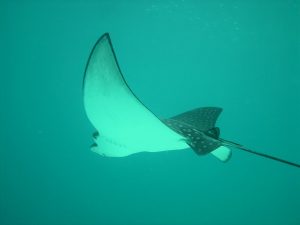 “I wait for him to circle past, reaching out to rub his velvet black head. I try to catch the silky tip of a wing as he glides by.”
“I wait for him to circle past, reaching out to rub his velvet black head. I try to catch the silky tip of a wing as he glides by.”
The sun sets behind the row of giant pines as I watch my manta ray son circle slowly near the bottom of the pool. I hunch at the edge, arms wrapped around my belly, like I’m bleeding from a hidden wound. I track my son’s smooth glide, intent on soaking up every inch of his dark bat-shaped body.
Last year when he was still wholly human, he darted about, dodging sharp corners by a hair, artfully prat-falling. I would put my nose in the crown of his tousled head, and savor his smell. Now I can’t tell his scent from a bucket of chum. I can only sit half-in, half-out of the pool for so long my skin never unpuckers, stinging from saltwater sores. I wait for him to circle past, reaching out to rub his velvet black head. I try to catch the silky tip of a wing as he glides by.
My husband came out earlier, to talk. He’s worried about our daughter, who’s gotten so skittish and wary, wanting to hole up in her room, burrow beneath her bed. I told him it’s the fox in her. A month ago she woke up with paws and a fluffy red tail. He thinks I’m neglecting her. Maybe I am, but she’s still mostly human and our son is not.
My husband has hired a special truck with a lift and a water tank to take our son to the ocean. This time tomorrow he’ll be gone.
The light just went off in our bedroom.
I have one more night to beg the Earth, in all its infinite wisdom, to change my son back.
* * *
So far the animal mutations affect children on the cusp of puberty. Overnight their extremities change to that of a threatened species. In California, it’s mostly bear, mountain lion, wolf, elk, and large marine animals, like sea elephants. A family from our elementary school was on an African safari. Their four children woke with the respective tails of a hyena, lion, elephant, the last with the antlers of an impala. They never came home.
Some of us tried plastic surgery, but the animal parts grew back.
We got used to the changes. There was even talk of restarting school. Some of the parents began to feel a kind of pride, like the mother of a boy with a bristly curly tail and tusks jutting from his jaw, going on about how smart wild pigs were.
Then the children transformed completely.
Governments passed sweeping wildlife reforms all over the world. The children needed clean habitats, unthreatened by humans. No more slaughter for trophies to hang on walls or poaching for superstitious cures. No more hunting at all. We are not animals who eat our young.
I suppose you think it all worked out for the best. The Earth setting itself right, putting balance back into the ecosystem.
To you and your beloved Earth I say this. May you stew in pollution. May you wheeze on carbon emissions and choke on the mountain of plastic in the oceans.
I don’t mean it. Please bring my son back.
* * *
The next morning I wake up next to my husband, staring at his back without blinking, gasping for breath through slits on my neck. The pillow’s silky with fallen-out hair.
I’m mute so I take care to bite him gently, then lick at the bead of blood. There’s a sudden rustling as he turns over, then a great upheaval, with sheets flying as he jumps out of bed, eyes bulging, mouth O-shaped.
I’m sorry that he’s upset.
There’s a fin sticking out of my back. I’ve seen those awful videos of sharks hauled up on the decks of boats. Their dorsals cut off; their mutilated bodies tossed back to die. I feel a rush of excitement. My change is only fair. It’s part of setting things right.
My husband huddles in a corner with hands on his face, his shoulders heaving.
Maybe I’ll become a megalodon, the biggest shark that ever lived. That would be cool, but I don’t think it works that way, since the megalodons were extinct before humans existed. Another big predator then–a tiger or a mako. Something sleek and fast, but without the cinematic baggage of a great white.
Maybe I can have sex with my husband one last time but no, only a shark’s clasper is fitting in there. I could make pancakes for him and our daughter one last time, but I don’t have all the ingredients and I’m not up for a trip to the grocery store.
He’s calm now. He’s come back to the bed, stroking my head softly. Soon he’ll carry me to the pool. When the time comes, he’ll ride in the truck that will take me and our son to the ocean. His lips will tickle the tough gray skin where my ears used to be, saying goodbye.
He’s a good father, and he’ll take care of our vulpine daughter, until the day she scampers away into the brush.
He’s losing his family, but I don’t think he is lost. The Earth loves all its animals right down to the microbes. Even the humans. She’ll keep some of them around, in the right amount.
Still, a part of me is sorry that he’s human through and through.
This is how the Earth answers me. Maybe it’s what I wanted all along–to drift into the ocean with my manta ray son. With a wave of his wings, he’ll glide away, disappearing in the darkness.
Then I’ll go too, racing after the scent of some wounded creature, following the spilled blood.
* * *
Originally published in Fantastic Stories of the Imagination
 About the Author
About the Author
K. A. Rochnik is a speculative fiction writer based in the San Francisco Bay Area. She writes science fiction novels and a wide range of short stories. Her stories have been published in Fantastic Stories of the Imagination, Strange California, NewMyths.com, EGM, and Frostfire Worlds. She is a graduate of the Odyssey Writing Workshop. She dedicates this story to her amazing golden retriever, Lexa!



